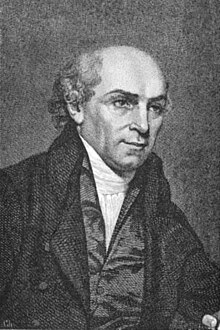
Back وليام كاري Arabic وليام كارى ARZ উইলিয়াম কেৰি Assamese উইলিয়াম কেরি Bengali/Bangla William Carey Catalan William Carey Czech William Carey Welsh William Carey German William Carey Spanish William Carey Finnish
William Carey | |
|---|---|
 Portrait of Carey, c. 1887 | |
| Born | 17 August 1761 Paulerspury, England |
| Died | 9 June 1834 (aged 72) Serampore, Bengal Presidency, British India |
| Signature | |
 | |
William Carey (17 August 1761 – 9 June 1834) was an English Christian missionary, Particular Baptist minister, translator, social reformer and cultural anthropologist who founded the Serampore College and the Serampore University, the first degree-awarding university in India[1] and cofounded the Serampore Mission Press.
He went to Calcutta (Kolkata) in 1793, but was forced to leave the British Indian territory by non-Baptist Christian missionaries.[2] He joined the Baptist missionaries in the Danish colony of Frederiksnagore in Serampore. One of his first contributions was to start schools for impoverished children where they were taught reading, writing, accounting and Christianity.[3] He opened the first theological university in Serampore offering divinity degrees,[4][5] and campaigned to end the practice of sati.[6]
Carey is known as the "father of modern missions."[7] His essay, An Enquiry into the Obligations of Christians to Use Means for the Conversion of the Heathens, led to the founding of the Baptist Missionary Society.[2][8] The Asiatic Society commended Carey for "his eminent services in opening the stores of Indian literature to the knowledge of Europe and for his extensive acquaintance with the science, the natural history and botany of this country and his useful contributions, in every branch."[9]
He translated the Hindu classic, the Ramayana, into English,[10] and the Bible into Bengali, Punjabi,[11] Oriya, Assamese, Marathi, Hindi and Sanskrit.[2] William Carey has been called a reformer and illustrious Christian missionary.[1][12][13]
- ^ a b Mangalwadi, Vishal (1999). The Legacy of William Carey: A Model for the Transformation of a Culture. Crossway Books. pp. 61–67. ISBN 978-1-58134-112-6.
- ^ a b c William Carey British missionary Encyclopædia Britannica.
- ^ Riddick, John F. (2006). The History of British India: A Chronology. Praeger Publications. p. 158. ISBN 0-313-32280-5.
- ^ "Northants celebrates 250th anniversary of William Carey". BBC News. 18 August 2011. Retrieved 7 November 2016.
- ^ Smith, George (1922). The Life of William Carey: Shoemaker & Missionary. J. M. Dent & Co. p. 292.
- ^ Sharma, Arvind (1988). Sati: Historical and Phenomenological Essays. Motilal Benarasidass. pp. 57–63. ISBN 81-208-0464-3.
- ^ Gonzalez, Justo L. (2010) The Story of Christianity Vol. 2: The Reformation to the Present Day, Zondervan, ISBN 978-0-06185589-4, p. 419
- ^ William Carey, An Enquiry into the Obligations of Christians to Use Means for the Conversion of the Heathens (1792; repr., London: Carey Kingsgate Press, 1961)
- ^ Thomas, T. Jacob (1994). "Interaction of the Gospel and Culture in Bengal" (PDF). Indian Journal of Theology. 36 (2). Serampore College Theology Department and Bishop's College, Kolkata: 46, 47.
- ^ Kopf, David (1969). British Orientalism and the Renaissance: The Dynamics of Indian Modernization 1778–1835. Calcutta: Firma K.L. Mukhopadhyay. pp. 70, 78.
- ^ "Saving souls and promoting good grammar". 7 September 2018.
- ^ Cite error: The named reference
bkp2was invoked but never defined (see the help page). - ^ V Rao (2007), Contemporary Education, pp. 17–18, ISBN 978-81-3130273-6